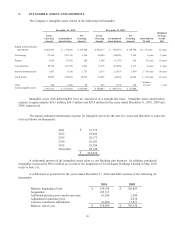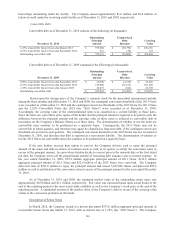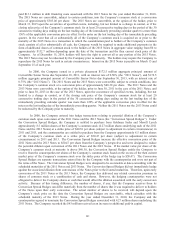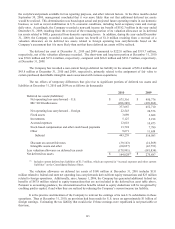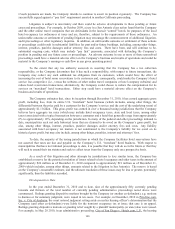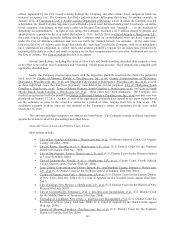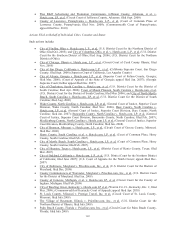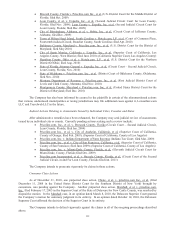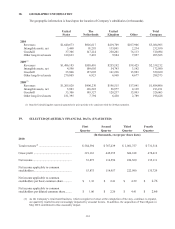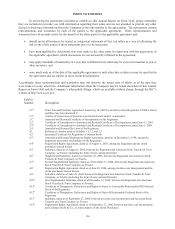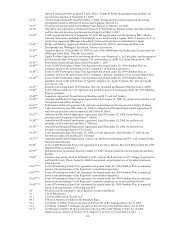Priceline 2010 Annual Report Download - page 182
Download and view the complete annual report
Please find page 182 of the 2010 Priceline annual report below. You can navigate through the pages in the report by either clicking on the pages listed below, or by using the keyword search tool below to find specific information within the annual report.
108
if such payments are made, the Company intends to continue to assert its position vigorously. The Company has
successfully argued against a “pay first” requirement asserted in another California proceeding.
Litigation is subject to uncertainty and there could be adverse developments in these pending or future
cases and proceedings. For example, in October 2009, a jury in a San Antonio class action found that the Company
and the other online travel companies that are defendants in the lawsuit “control” hotels for purposes of the local
hotel occupancy tax ordinances at issue and are, therefore, subject to the requirements of those ordinances. An
unfavorable outcome or settlement of pending litigation may encourage the commencement of additional litigation,
audit proceedings or other regulatory inquiries. In addition, an unfavorable outcome or settlement of these actions
or proceedings could result in substantial liabilities for past and/or future bookings, including, among other things,
interest, penalties, punitive damages and/or attorney fees and costs. There have been, and will continue to be,
substantial ongoing costs, which may include “pay first” payments, associated with defending the Company’s
position in pending and any future cases or proceedings. An adverse outcome in one or more of these unresolved
proceedings could have a material adverse effect on the Company’s business and results of operations and could be
material to the Company’s earnings or cash flow in any given operating period.
To the extent that any tax authority succeeds in asserting that the Company has a tax collection
responsibility, or the Company determines that it has such a responsibility, with respect to future transactions, the
Company may collect any such additional tax obligation from its customers, which would have the effect of
increasing the cost of hotel room reservations to its customers and, consequently, could make the Company’s hotel
service less competitive (i.e., versus the websites of other online travel companies or hotel company websites) and
reduce hotel reservation transactions; alternatively, the Company could choose to reduce the compensation for its
services on “merchant” hotel transactions. Either step could have a material adverse effect on the Company’s
business and results of operations.
The Company estimates that, since its inception through December 31, 2010, it has earned aggregate gross
profit, including fees, from its entire U.S. “merchant” hotel business (which includes, among other things, the
differential between the price paid by a customer for the Company’s service and the cost of the underlying room) of
approximately $1.1 billion. This gross profit was earned in over a thousand taxing jurisdictions that the Company
believes have aggregate tax rates (which may include hotel occupancy taxes, state and local taxes, among other
taxes) associated with a typical transaction between a consumer and a hotel that generally range from approximately
6% to approximately 18%, depending on the jurisdiction. In many of the judicial and other proceedings initiated to
date, municipalities seek not only historical taxes that are claimed to be owed on the Company’s gross profit, but
also, among other things, interest, penalties, punitive damages and/or attorney fees and costs. Any liability
associated with hotel occupancy tax matters is not constrained to the Company’s liability for tax owed on its
historical gross profit, but may also include, among other things, penalties, interest and attorneys’ fees.
To date, the majority of the taxing jurisdictions in which the Company facilitates hotel reservations have
not asserted that taxes are due and payable on the Company’s U.S. “merchant” hotel business. With respect to
municipalities that have not initiated proceedings to date, it is possible that they will do so in the future or that they
will seek to amend their tax statutes and seek to collect taxes from the Company only on a prospective basis.
As a result of this litigation and other attempts by jurisdictions to levy similar taxes, the Company has
established a reserve for the potential resolution of issues related to hotel occupancy and other taxes in the amount of
approximately $26 million as of December 31, 2010 compared to approximately $21 million as of December 31,
2009 (which includes, among other things, amounts related to the litigation in San Antonio). The reserve is based
on the Company’s reasonable estimate, and the ultimate resolution of these issues may be less or greater, potentially
significantly, than the liabilities recorded.
Developments to Date
In the year ended December 31, 2010 and to date, nine of the approximately fifty currently pending
lawsuits and thirteen of the total number of currently pending administrative proceedings noted above were
commenced. Rulings granting dispositive motions brought by the Company (or another co-defendant), e.g. motions
to dismiss or for summary judgment, were issued in ten cases. For example, in December, 2010 in Priceline.com,
Inc. v. City of Anaheim, the court entered judgment setting aside an earlier hearing officer’s determination that the
Company (and other co-defendants) were liable for the transient occupancy tax at issue; that case is on appeal.
Rulings granting dispositive motions or granting relief sought by a plaintiff municipality (or state) also were issued.
For example, in May 28 2010, in an administrative proceeding, City of San Diego v. Hotels.com, L.P., the hearing


